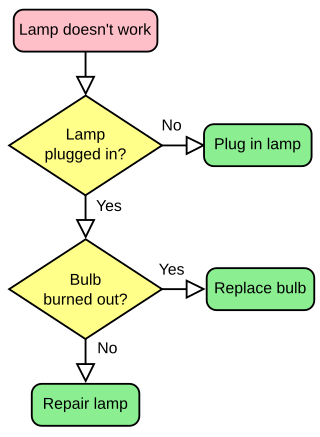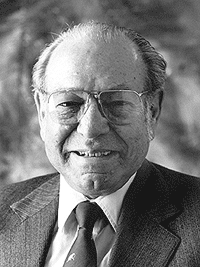Related Research Articles
A quality management system (QMS) is a collection of business processes focused on consistently meeting customer requirements and enhancing their satisfaction. It is aligned with an organization's purpose and strategic direction. It is expressed as the organizational goals and aspirations, policies, processes, documented information, and resources needed to implement and maintain it. Early quality management systems emphasized predictable outcomes of an industrial product production line, using simple statistics and random sampling. By the 20th century, labor inputs were typically the most costly inputs in most industrialized societies, so focus shifted to team cooperation and dynamics, especially the early signaling of problems via a continual improvement cycle. In the 21st century, QMS has tended to converge with sustainability and transparency initiatives, as both investor and customer satisfaction and perceived quality are increasingly tied to these factors. Of QMS regimes, the ISO 9000 family of standards is probably the most widely implemented worldwide – the ISO 19011 audit regime applies to both and deals with quality and sustainability and their integration.
Quality assurance (QA) is the term used in both manufacturing and service industries to describe the systematic efforts taken to assure that the product(s) delivered to customer(s) meet with the contractual and other agreed upon performance, design, reliability, and maintainability expectations of that customer. The core purpose of Quality Assurance is to prevent mistakes and defects in the development and production of both manufactured products, such as automobiles and shoes, and delivered services, such as automotive repair and athletic shoe design. Assuring quality and therefore avoiding problems and delays when delivering products or services to customers is what ISO 9000 defines as that "part of quality management focused on providing confidence that quality requirements will be fulfilled". This defect prevention aspect of quality assurance differs from the defect detection aspect of quality control and has been referred to as a shift left since it focuses on quality efforts earlier in product development and production and on avoiding defects in the first place rather than correcting them after the fact.
Common and special causes are the two distinct origins of variation in a process, as defined in the statistical thinking and methods of Walter A. Shewhart and W. Edwards Deming. Briefly, "common causes", also called natural patterns, are the usual, historical, quantifiable variation in a system, while "special causes" are unusual, not previously observed, non-quantifiable variation.
Genichi Taguchi was an engineer and statistician. From the 1950s on, Taguchi developed a methodology for applying statistics to improve the quality of manufactured goods. Taguchi methods have been controversial among some conventional Western statisticians, but others have accepted many of the concepts introduced by him as valid extensions to the body of knowledge.
Statistical process control (SPC) or statistical quality control (SQC) is the application of statistical methods to monitor and control the quality of a production process. This helps to ensure that the process operates efficiently, producing more specification-conforming products with less waste scrap. SPC can be applied to any process where the "conforming product" output can be measured. Key tools used in SPC include run charts, control charts, a focus on continuous improvement, and the design of experiments. An example of a process where SPC is applied is manufacturing lines.

The American Society for Quality (ASQ), formerly the American Society for Quality Control (ASQC), is a society of quality professionals, with nearly 800,000 members.
Reliability engineering is a sub-discipline of systems engineering that emphasizes the ability of equipment to function without failure. Reliability describes the ability of a system or component to function under stated conditions for a specified period of time. Reliability is closely related to availability, which is typically described as the ability of a component or system to function at a specified moment or interval of time.
Project Management Professional (PMP) is an internationally recognized professional designation offered by the Project Management Institute (PMI). As of 31 July 2020, there are 1,036,368 active PMP-certified individuals and 314 chartered chapters across 214 countries and territories worldwide.
DMAIC refers to a data-driven improvement cycle used for improving, optimizing and stabilizing business processes and designs. The DMAIC improvement cycle is the core tool used to drive Six Sigma projects. However, DMAIC is not exclusive to Six Sigma and can be used as the framework for other improvement applications.
The Association of Technology, Management and Applied Engineering (ATMAE) sets standards for academic program accreditation, personal certification and professional development for educators and industry professionals involved in integrating technology, leadership and design.

The seven basic tools of quality are a fixed set of visual exercises identified as being most helpful in troubleshooting issues related to quality. They are called basic because they are suitable for people with little formal training in statistics and because they can be used to solve the vast majority of quality-related issues.
Software quality management (SQM) is a management process that aims to develop and manage the quality of software in such a way so as to best ensure that the product meets the quality standards expected by the customer while also meeting any necessary regulatory and developer requirements, if any. Software quality managers require software to be tested before it is released to the market, and they do this using a cyclical process-based quality assessment in order to reveal and fix bugs before release. Their job is not only to ensure their software is in good shape for the consumer but also to encourage a culture of quality throughout the enterprise.
Quality engineering is the discipline of engineering concerned with the principles and practice of product and service quality assurance and control. In software development, it is the management, development, operation and maintenance of IT systems and enterprise architectures with a high quality standard.
A Certified Quality Auditor (CQA) is a professional that knows and employs the standards and principles associated with auditing. A CQA is capable of using various evaluation techniques to identify a production system's strengths and weaknesses in quality control.
The Certified Business Manager (CBM) is a credential created and administered by the Association of Professionals in Business Management (APBM). It was designed to validate the mastery of business management knowledge, skills, and abilities.

Dorian Shainin was an American quality consultant, aeronautics engineer, author, and college professor most notable for his contributions in the fields of industrial problem solving, product reliability, and quality engineering, particularly the creation and development of the "Red X" concept.

The International Requirements Engineering Board (IREB) e.V. was founded in Fürth in Germany in October 2006. IREB e.V. is as a legal entity based in Germany.
Industrial and production engineering (IPE) is an interdisciplinary engineering discipline that includes manufacturing technology, engineering sciences, management science, and optimization of complex processes, systems, or organizations. It is concerned with the understanding and application of engineering procedures in manufacturing processes and production methods. Industrial engineering dates back all the way to the industrial revolution, initiated in 1700s by Sir Adam Smith, Henry Ford, Eli Whitney, Frank Gilbreth and Lilian Gilbreth, Henry Gantt, F.W. Taylor, etc. After the 1970s, industrial and production engineering developed worldwide and started to widely use automation and robotics. Industrial and production engineering includes three areas: Mechanical engineering, industrial engineering, and management science.
Connie M. Borror was an American statistician and industrial engineer interested in quality control and forensic toxicology. She was named the winner of the Shewhart Medal of the American Society for Quality shortly before her death, for "outstanding technical leadership in the field of modern quality control, especially through the development to its theory, principles, and techniques", and became the first woman to win the medal.
Thomas Pyzdek is an American author and management consultant. He is best known for being an advocate of operational excellence and is an author of several books, hundreds of articles and papers on those topics.
References
- Berger, Roger W.; Benbow, Donald W.; Elshennawy, Ahmad K.; Walker, H. Fred (2001). The Certified Quality Engineer Handbook (1st ed.). ASQ Quality Press, Milwaukee, Wisconsin. ISBN 978-0873895026.
- Berger, Roger W.; Benbow, Donald W.; Elshennawy, Ahmad K.; Walker, H. Fred (Editors) (2007). The Certified Quality Engineer Handbook (2nd ed.). ASQ Quality Press, Milwaukee, Wisconsin. ISBN 978-0873897006.
{{cite book}}:|first4=has generic name (help)
- Borror, Connie M., ed. (2009). The Certified Quality Engineer Handbook (3rd ed.). ASQ Quality Press, Milwaukee, Wisconsin. ISBN 978-0-87389-745-7.
- Burke, Sarah E.; Silvestrini, Rachel T. (Editors) (2017). The Certified Quality Engineer Handbook (4th ed.). ASQ Quality Press, Milwaukee, Wisconsin. ISBN 9780-87389-944-4.
{{cite book}}:|first2=has generic name (help)